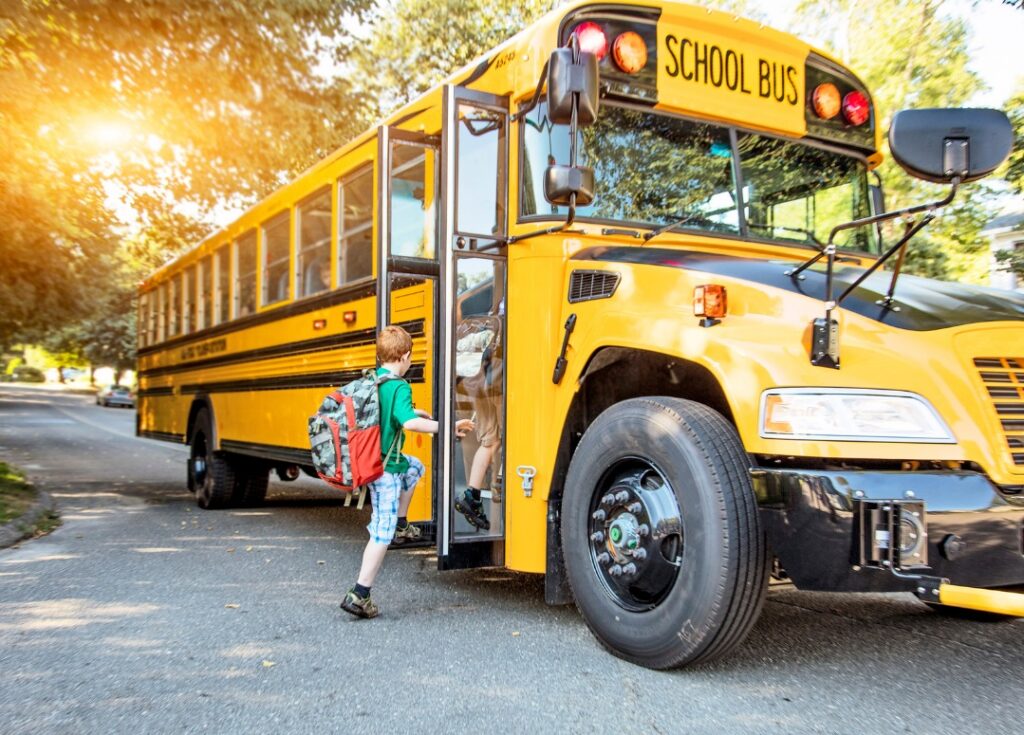This is a 3-Part Series on School Refusal
What to do When Your Child Refuses to go to School
How Neurofeedback Helps School Refusal Behaviors and Underlying Root Issues
When a student refuses to go to school for extended periods, there is a tremendous amount of stress on the student, their family and school personnel to support the school enough to get back to school. A home-school collaborative relationship is essential in helping address the underlying causes and create a proactive plan to get kids back to school.
Why do Children Refuse to go to School?
School refusal is an increasingly common problem amongst school age and high school students in the United States, as rates have increased from 1% in 2001 (Heyne, 2001) to 2% to 5% (Kawsar, Yilanli and Marwaha, 2022).
While there are many underlying reasons why kids refuse to attend school, there is one theory as to why the behaviors continue. Research (Kearney, 2002 and Kearney et. al, 2005) shows that school avoidance behaviors in children are maintained for four main reasons:
- Domain 1: Avoidance of Negative Affect (anxiety, depression, somatic complaints, sadness)
- Domain 2: Escape from Evaluative or Social Situations (social phobia, OCD perfectionism)
- Domain 3: Attention Seeking Behavior (separation anxiety, sympathy from family, high enmeshment)
- Domain 4: Pursuit of Tangible Reinforcers (video games, internet, sleep, drug use)
Strategies to Address Student School Refusals
Assess Needs
When a child is frozen and unwilling to attend school, then it is time to step back and look at why this is happening. Identifying needs means we can put a plan in place that will help a student feel safe enough to not just return but actually stay in school.
A mix of informal and formal assessment to look at root causes and assess coping and problem solving skills and resources is important. Having the student participate as much as they feel comfortable not only helps to get to the bottom of the issue but gives the distressed student more control and ownership of the return plan.
Have a Team Meeting
Parents and school personnel have different data points and that means that they may each view the problem very differently. Having spent more than 20 years doing evaluations and going to IEP and 504 meetings, misperceptions and inflexible thinking on both sides of the table often led to high conflict meetings.
Included in the team should be any outside providers including therapists and medical providers and gathering their input on emotional, behavioral and physical needs should be part of the plan.
Parents should come prepared to a school meeting with questions and work to paint the behavioral picture of where your kid is struggling.
The best and most productive meetings occurred when all parties came with an open mind and focus on student needs. Sometimes the most successful plans were born out of brainstorming sessions that led to simple but well throughout strategies to get a kid back to school.
Frequent communication without blaming language can go a long way to helping a school avoidant student become mentally well and safely return to school.
Don't Assume You Know What The Underlying Issue(s) Is
Wouldn't it be nice if we all had the answers to why every kid refuses to walk out that door or get on that bus? We don't. School refusal is a complex and layered issue that always has a physical and/or mental health root cause. No kid wants to be so afraid and hopeless that they can't get to school and nor do their parents.
Conditions such as attention problems, anxiety, social anxiety, depression, OCD, or PANS/PANDAS or other underlying mental health issues are common contributing issues that cause kids to shut down. When school personnel, medical providers, mental health professionals and parents take a 360 view, they can get to the bottom of the real root cause and help kids achieve emotional stability.
Focus on Psychoeducation
Once underlying issues are identified, parent and student psychoeducation about the issue(s) is important. When a student better understands the why behind their sensations, thoughts and feelings, they can let go of shame and blame and work toward gaining coping skills. Both parents and the student are fearful and psychoeducation about how fear hijacks the brain can be both validating and useful.
Whether a school psychologist, social worker or counselor, dispelling mental health myths and misconceptions, as well as teaching parents about how to shape desired behaviors can go a long way in helping a student get back to school.
Look at Learning and Attention Needs
Children and teens who exhibit school refusal behaviors might have underlying learning or attention problems. In some cases, emotional issues precipitate the learning and attention issues and other times it is learning and attention issues that lead to emotional distress. In either case, just about every student with school refusal issues will struggle with learning and attention when they are in the crisis of full refusal.
Thinking about what the student needs within the classroom or in crafting alternative programming should be a part of every school re-entry plan. Getting kids to enjoy learning again is achievable when the right plan is crafted.
Support Coping Skills and Emotional Needs
Kids who refuse to go to school are in an emotional crisis. No kid wants to be home away from friends and a normal routine, but their nervous system is stuck in a “rev state”, and this is just a self-preservation shut down. Assessing what emotional support a student needs from various building accommodations, meeting with school personnel, adding support services, or giving student specific therapies such as cognitive behavioral therapy, executive functioning support and so on needs to occur before a student returns to school.
Assess if an IEP or 504 Accommodation Plan is Needed
Sometimes when a school refusal happens, it opens a Pandora's box to underlying learning or other root cause issues that require more formal support through an IEP or 504 Accommodation Plan. As part of the initial informal assessment of the problem, consideration of entering the formal assessment process or modifying an existing IEP or 504 should occur.
If an IEP plan for school refusal or 504 Accommodation Plan for school refusal is deemed not necessary, then formal goals should be created to support the reentry process for a student with school refusal.
Create a Detailed Return To School Plan
A detailed school reentry plan should consider all the micro-steps and components needed to help a student smoothly return to school. That means team communication and collaboration, as well as direct input from a student.
Proactive planning for anxiety, and specifically separation anxiety and social anxiety and ways to support a student at school helps to prevent further behavioral deterioration.
A tiered approach to reentry often is the best plan and requires thinking about what classes and times are best for students to start with. While attending for a full school day is the ultimate goal, shorter school days to start with is more realistic and helps to reduce anxiety. Structure and routine should always be part of the school and home plan, so students have purpose and predictability in the day.
Working with both the student and parents to create a detailed return plan that is thoughtfully created and flexible is a critical component of aligning the team.
Create Safe Exposures
Exposure therapy is about exposing a person to their fears and worries in a safe way that builds internal confidence and inner resilience that over time reduces or eliminates those worries or fears. Assessing what kind of school environments create safety for a student helps to proactively address potential issues.
Thinking about in what ways we can create opportunities for safe exposures to help students build confidence and coping skills is part of the process of building up a student’s emotional health.
Reinforce Desired Behaviors
New behaviors don’t just magically appear, they are shaped over time through a process of reinforcement. School refusal can feel like quicksand for parents and team members can get trapped too when we over focus on the return to school instead of the steps needed to get there.
That is where psychoeducation comes into play because when a person understands the why behind their mental health struggles and the micro-steps steps needed to create change, they don’t feel so overwhelmed. When distressed, most are easily overwhelmed and see success as an all or nothing.
“I am a complete failure unless I am back at school.” When we flip that script by focusing on and reinforcing the broken down steps, kids and families can experience success, and more importantly, feel hopeful.
Citations:
Heyne, D., King, N. J., Tonge, B. J., & Cooper, H. (2001). School refusal: epidemiology and management. Paediatric drugs, 3(10), 719–732. https://doi.org/10.2165/00128072-200103100-00002
Inglés, C. J., Gonzálvez-Maciá, C., García-Fernández, J. M., Vicent, M., & Martínez-Monteagudo, M. C. (2015). Current status of research on school refusal. European Journal of Education and Psychology, 8(1), 37–52. https://doi.org/10.1016/j.ejeps.2015.10.005
Kawsar MDS, Yilanli M, Marwaha R. School Refusal. [Updated 2022 Feb 7]. In: StatPearls [Internet]. Treasure Island (FL): StatPearls Publishing; 2022 Jan-. Available from: https://www.ncbi.nlm.nih.gov/books/NBK534195/
Kearney, C. A. (2002). Identifying the function of school refusal behavior: A revision of the School Refusal Assessment Scale. Journal of Psychopathology and Behavioral Assessment, 24(4), 235–245. https://doi.org/10.1023/A:1020774932043
Kearney, C. A., Chapman, G., & Cook, L. C. (2005). Moving from assessment to treatment of school refusal behavior in youth. International Journal of Behavioral Consultation and Therapy, 1(1), 46-51. http://dx.doi.org/10.1037/h0100733
Always remember… “Calm Brain, Happy Family™
Disclaimer: This article is not intended to give health advice and it is recommended to consult with a physician before beginning any new wellness regime. *The effectiveness of diagnosis and treatment vary by patient and condition. Dr. Roseann Capanna-Hodge, LLC does not guarantee certain results.
Are you looking for SOLUTIONS for your struggling child or teen?
Dr. Roseann and her team are all about solutions, so you are in the right place!
There are 3 ways to work with Dr. Roseann:
- In-person at her Ridgefield, CT center
- Virtually with her at home neurofeedback and coaching programs
- By getting her BrainBehaviorReset™ Toolkit
You can get her books for parents and professionals, including: It’s Gonna Be OK™: Proven Ways to Improve Your Child’s Mental Health, Teletherapy Toolkit™ and Brain Under Attack: A Resource For Parents and Caregivers of Children With PANS, PANDAS, and Autoimmune Encephalopathy.
If you are a business or organization that needs proactive guidance to support employee mental health or an organization looking for a brand representative, check out Dr. Roseann’s professional speaking page to see how we can work together.
Dr. Roseann is a Children’s Mental Health Expert and Therapist who has been featured in/on hundreds of media outlets including, CBS, NBC, FOX News, PIX11 NYC, The New York Times, The Washington Post,, Business Insider, USA Today, CNET, Marth Stewart, and PARENTS. FORBES called her, “A thought leader in children’s mental health.”
She is the founder and director of The Global Institute of Children’s Mental Health and Dr. Roseann Capanna-Hodge. Dr. Roseann is a Board Certified Neurofeedback (BCN) Practitioner, a Board Member of the Northeast Region Biofeedback Society (NRBS), Certified Integrative Medicine Mental Health Provider (CMHIMP) and an Amen Clinic Certified Brain Health Coach. She is also a member of The International Lyme Disease and Associated Disease Society (ILADS), The American Psychological Association (APA), Anxiety and Depression Association of America (ADAA) National Association of School Psychologists (NASP), International OCD Foundation (IOCDF) International Society for Neurofeedback and Research (ISNR) and The Association of Applied Psychophysiology and Biofeedback (AAPB).
© Roseann-Capanna-Hodge, LLC 2022
You can get her books for parents and professionals, including: It’s Gonna Be OK™: Proven Ways to Improve Your Child’s Mental Health, Teletherapy Toolkit™ and Brain Under Attack: A Resource For Parents and Caregivers of Children With PANS, PANDAS, and Autoimmune Encephalopathy.
If you are a business or organization that needs proactive guidance to support employee mental health or an organization looking for a brand representative, check out Dr. Roseann’s media page and professional speaking page to see how we can work together.
Dr. Roseann is a Children’s Mental Health Expert and Therapist who has been featured in/on hundreds of media outlets including, CBS, NBC, FOX News, PIX11 NYC, The New York Times, The Washington Post,, Business Insider, USA Today, CNET, Marth Stewart, and PARENTS. FORBES called her, “A thought leader in children’s mental health.”

She is the founder and director of The Global Institute of Children’s Mental Health and Dr. Roseann Capanna-Hodge. Dr. Roseann is a Board Certified Neurofeedback (BCN) Practitioner, a Board Member of the Northeast Region Biofeedback Society (NRBS), Certified Integrative Medicine Mental Health Provider (CMHIMP) and an Amen Clinic Certified Brain Health Coach. She is also a member of The International Lyme Disease and Associated Disease Society (ILADS), The American Psychological Association (APA), Anxiety and Depression Association of America (ADAA) National Association of School Psychologists (NASP), International OCD Foundation (IOCDF) International Society for Neurofeedback and Research (ISNR) and The Association of Applied Psychophysiology and Biofeedback (AAPB).
© Roseann-Capanna-Hodge, LLC 2023
Disclaimer: This article is not intended to give health advice and it is recommended to consult with a physician before beginning any new wellness regime. *The effectiveness of diagnosis and treatment vary by patient and condition. Dr. Roseann Capanna-Hodge, LLC does not guarantee certain results.













